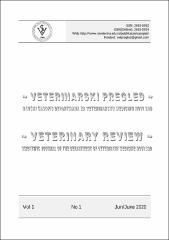In vitro ovicidal effect of common juniper (Juniperus communis l.) essential oil on sheep gastrointestinal nematodes

View/
Date
2020Author
Štrbac, Filip
Bosco, Antonio
Amadesi, Alessandra
Rinaldi, Laura
Stojanović, Dragica
Simin, Nataša
Orčić, Dejan
Pušić, Ivan
Krnjajić, Slobodan
Ratajac, Radomir
Metadata
Show full item recordAbstract
The negative influence of gastrointestinal parasitism in sheep is growing today due to the development of anthelmintic resistance to commercial drugs. For this reason, researchers around the world are looking for new, alternative strategies for controlling these parasites. In this context, medicinal plants and their products are increasingly mentioned. The aim of this study was to evaluate in vitro ovicidal activity of common juniper (Juniperus communis L.) essential oil against sheep gastrointestinal nematodes. For that purpose, the egg hatch test was used, and the obtained results were analyzed by analysis of variance (ANOVA) followed by comparison with Tukey’s test (p<0.05). Faecal samples were collected from two independent, natural-infected farms located in Eboli (SA), Italy, whereby the coproculture examination identified the presence of four genera of sheep gastrointestinal nematodes: Haemonchus (53%), Trichostrngylus (29.5%), Teladorsagia (14.5%) and Chabertia (3%). Main components of common juniper essential oil identified by GC-MS analysis were α-pinene (40.46%), sabinene (14.04%), myrcene (8.87%) and limonene (4.95%). In vitro ovicidal activity was evaluated at six different concentrations (50, 12.5, 3.125, 0.781, 0.195 and 0.049 mg/mL), whereby J. communis essential oil showed high activity with the inhibitory effect on hatchability of 81-96.75%, depending on the concentration. For all concentration tested, the effect was statistically significantly higher compared to the negative control, while for the three highest concentrations the effect was similar to the positive control. The obtained results suggested that J. communis essential oil have high anthelmintic potential. However, these results need confirmation in further field examination.
